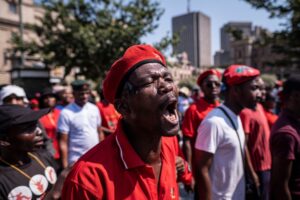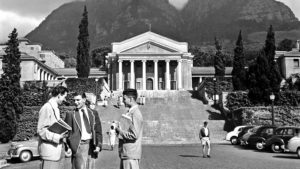Shortly before Britain’s skelm (furtive) and short-lived annexation of the Transvaal Boer republic, the Victorian travel writer Anthony Trollope said this of the unfortunate country:
“These people in the Transvaal would not pay a stiver of tax, there was in fact no government, the gaols were unlocked in order that prisoners might find elsewhere the bread which their gaolers could not get for them, the posts could not be continued because the Contractors were not paid… property was unsaleable, life was insecure, chaos was come upon the land.”
The year was 1877. In not entirely dissimilar circumstances, 147 years later, President Cyril Ramaphosa this week announced a South African general election for May 29. The answer to a now pressing question rests on its outcome: can the country resume its march to modernity after three decades of misrule and corruption under the ruling African National Congress (ANC)?
The election is a contest between two broad coalitions. On the one side stands a wide range of ethnic, religious, regional and class groups, unsteadily allied in a reformist and modernist Multi-Party Pact, dubbed the “Moonshot Pact”. It musters an estimated third of the electorate; the largest component is the liberal Democratic Alliance (DA), with more than a fifth of the total vote — according to an average composite of the six most credible recent polls. The alliance is concerned about state incompetence, corruption, and the combination of meagre economic growth and unsustainable state social spending.
Against them stands a larger polity far more exercised about the continuation of the extensive grant system — 45% of South Africans receive some form of welfare subsidy and that proportion will soon grow, with a minimum income grant — and the survival of the “black empowerment” policies that have seen the enrichment of a new parasitic elite class comprising about 1% of the population. This proportion of the population is unsettlingly similar to the 43.6% estimated share of the vote that a composite of the polls gives the ruling ANC in the coming elections.
The two wild cards are the 11-year-old Left-wing, incendiary and nativist Economic Freedom Fighters (EFF) — its leaders mostly expelled members of the ANC’s radical Youth League — and a new party, uMkhonto weSizwe Party (MKP), cheekily named after the military wing of the struggle-era ANC. It is supported by the disgraced and corruption-plagued former ANC president Jacob Zuma, finally divorced from his birth party.
The EFF’s economic policies are extortionist and redistributionist, rather than growth focused. And its rhetoric is deliberately provocative to white and Asian minorities. Its estimated support, based on the last six polls, is 15%, but perhaps as high as 18.5%, which would make it the Official Opposition by some counts. The higher range is not impossible given that, of the 1.2 million names recently added to the roll in an official voter drive, 77% were under the age of 29, many no doubt enraged at the ruling party’s corrupt management of the national student funding agency. This is the fertile territory in which the energetic and agile EFF flourish.
The infant MKP leadership, meanwhile, is widely seen as an Alliance of the Seriously Miffed: a composite of Zuma family members, the criminal networks that flourished under Zuma but were displaced by Ramaphosa’s people, and even some renegade former National Intelligence Agency operatives. Yet it would be unwise to dismiss them, not least because some individuals are believed to have been behind the largely Zulu-supported failed insurrection of July 2021, and they may still have access to large amounts of skelm money. A recent poll showed that 63% of Zulus in the province of KwaZulu Natal are sympathetic to the 81-year-old Zuma and 12 times as many people think he was a better President than Ramaphosa. Such is the power of tribalism — or ethno-nationalism.
The same poll indicated that the MKP could take half the ANC vote in KwaZulu Natal, opening intriguing possibilities for coalitions and devolutionist bids for a Zulu homeland. However, this assumes the MKP could fully mobilise in time for the contest, which is doubtful, and that ANC court action to deny it of its name fails.
KwaZulu Natal, home to five generations of my family, is historically one of the most militarily fought-over patches of turf in South Africa. And once again it will see a contest, hopefully peaceful, for the support of the Zulus, which is the country’s largest ethnic group, , totalling 10 million people. The sympathies of the new Zulu King, Misuzulu kaZwelithini, are unknown but could be influential. Three of the four main parties are launching their manifestos here, including the resurgent Zulu traditionalist Inkatha Freedom Party (IFP).
This situation is complicated even more by recent changes to the Electoral Act which make it easier for smaller parties to stand. More than 350 parties have registered, a reflection of the widespread disaffection with mainstream parties and the emergence of a muscular localism as communities seek to “state-proof” themselves from a failing and largely despised central government. A third of registered voters in one poll say no political party represents their views.
Meanwhile, the ruling party brings to the hustings a luminous record of failure. This was symbolised by President Ramaphosa’s humiliating State of The Nation Address (SONA) on 8 February this year, which was held in the Cape Town City Hall. The graceful 114-year-old Parliament building it usually takes place in was torched two years ago, by an allegedly deranged homeless person who for three days roamed the empty building unchallenged before finally burning it down.
It is not a good time for the ruling party to go to the electorate, but the law requires that the general election take place before August this year. Virtually every economic and social metric is negative; the only thing flourishing is state and social spending, so much so that even the National Treasury warns it is unsustainable. A sere budget precedes the elections. Yet Ramaphosa claims that it is mostly due to external and structural factors and “State Capture” under his predecessor, ignoring the fact he was Deputy President during the worst years of ANC corruption. Bizarrely, he points to the massive growth in poverty relief programmes as an achievement rather than what it is: an indicator of dire state failure.
In a modern democracy such a record of governance would cast the ruling party into oblivion. Not so in South Africa. To many, particularly poor and rural black people, the ANC is a powerful, even mystical brand. There is nostalgic pride in the ANC’s 112-year-long struggle for black emancipation and dignity — which is why the partly is fighting furiously through the courts to forbid the MK Party from appropriating the hallowed name of its military wing. (Ironically, that wing was so ineffectual that it played little part in bringing about a democratic South Africa.)
Yet the ANC, from a high of 72% of the vote in 2004, will most likely lose its overall majority in May for the first time in 30 years, and be forced into political or voting coalitions to retain control. Such coalitions under the country’s proportional representation system have proved unstable and unproductive at local government level in the past. Stakeholders vie, sometimes violently, for access to the patronage and corruption networks which are endemic in state institutions and indeed the society.
Still, optimists put forward a possible reformist and modernist coalition led by the DA — with its excellent track record of governance in the Western Cape — sans the ANC. The numbers, at about 35% of the vote share, do not stack up yet, but this may well change by polling day. A significant number of voters are uncommitted, and the impact of the MKP remains uncertain. If the ANC does gain the support currently predicted, it would have first crack at forming a government. If it were to choose the DA and the Moonshot Pact, it would represent, effectively, a government of national unity not dissimilar to the Pact Government in South Africa in the Twenties, formed to confront a national crisis.
Yet six years of President Ramaphosa’s rule, once naively welcomed by reformers and modernisers, has put paid to any such hope. His tenure has been marked by indecisive and ineffectual leadership, a collapse of state infrastructure and a willingness to drive impractical and destructive redistributive and anti-growth policies to keep his flailing party together and to please his entitlement-driven electorate. His ineptitude has created the space for toxic organisations such as the EFF and now MK to flourish.
Internationally, he grandstands in support of the least appealing members of the so-called Global South, even at the risk of alienating powerful allies and investors. And South Africa is paying the price. Nigerian bonds have for the first time proved more attractive to international traders than South African ones. In recent years, R1 trillion in foreign investment has fled the country (1 USD = R19) and every impoverished southern African neighbour has, according to World Bank numbers, outperformed ANC-run South Africa in terms of GDP growth in the last 30 years.
If it loses its majority, the ANC will hope to cobble together a political or voting alliance with the fickle and biddable minority parties who are expected to claim about 6% of the vote. If this fails — and the showing of the MKP may be the scupper factor — the ANC’s natural partners would either be the EFF or, at a stretch, the MKP. In which case South Africa, once considered the Singapore of Africa, must contemplate an uncomfortable foreland in which a stalled process of modernity is managed by an alliance of corrupt mass-based rural parties and a pillaging urban elite. One does not have to look far for an uncomfortable parallel. It is across the Limpopo River in Zimbabwe where Trollope’s Transvaal chaos has for decades come upon the land.
Disclaimer
Some of the posts we share are controversial and we do not necessarily agree with them in the whole extend. Sometimes we agree with the content or part of it but we do not agree with the narration or language. Nevertheless we find them somehow interesting, valuable and/or informative or we share them, because we strongly believe in freedom of speech, free press and journalism. We strongly encourage you to have a critical approach to all the content, do your own research and analysis to build your own opinion.
We would be glad to have your feedback.
Source: UnHerd Read the original article here: https://unherd.com/




